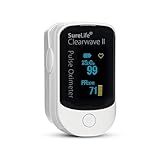Health Monitoring Devices
Curated picks for smarter shopping choices
This product guide is designed to help older adults navigate the world of health monitoring devices. These devices provide a practical way to track and manage your health, offering benefits such as early disease detection, peace of mind, and improved independence. By shopping online, you can compare features, prices, and reviews to find the device that best meets your individual health needs.
As an Amazon Partner, we may be compensated if you make a purchase – at no additional cost to you. Last update on 2025-09-28 / Affiliate links / Images from Amazon Product Advertising API
Click here to see more on Amazon
What to Look for Before You Buy
Accuracy: The accuracy of the health monitoring device is crucial. It should be able to produce consistent and reliable results. Look for devices that have been clinically validated for their accuracy.
Ease of use: The device should be user-friendly, with simple instructions and easy-to-read displays. It should be straightforward to operate, even for elderly individuals or those who are not technologically savvy.
Connectivity: Many health monitoring devices can connect to smartphones or computers to track and record data over time. This can make it easier to share information with healthcare providers and monitor trends in your health.
Comfort and Design: The device should be comfortable to wear or use, especially if it needs to be worn continuously. The design should also be sleek and unobtrusive.
Battery Life: If the device operates on batteries, it’s important to know how long the battery will last and how often it will need to be replaced or recharged. A good health monitoring device should have a long battery life for convenience.
Smart Alternatives
Fitbit Charge 4: This advanced health and fitness tracker offers features such as built-in GPS, heart rate tracking, sleep and swim tracking, and is compatible with most smartphones for notifications and app alerts. It also provides up to 7 days of battery life.
Withings Body+ – Smart Body Composition Wi-Fi Digital Scale: This health monitoring device tracks weight, body fat and water percentages, as well as muscle and bone mass. It also syncs with your smartphone to give you a comprehensive overview of your health and progress over time.
Apple Watch Series 6: Not only a smartwatch, but also a comprehensive health monitoring device. It offers features such as blood oxygen level measurement, ECG readings, sleep tracking, workout tracking, heart rate monitoring, and more. It also integrates with iPhones for notifications and app functionality.
Performance and Ease of Use
Health Monitoring Devices typically perform exceptionally well in terms of accuracy, reliability, and real-time data provision. They are designed to monitor and record a wide range of health parameters such as heart rate, blood pressure, sleep patterns, and blood sugar levels, among others. The ease of use is another commendable aspect; these devices are user-friendly and can be easily operated by individuals with no technical expertise. Their compact size and portability make it feasible to carry them around. Furthermore, the data from these devices can be conveniently accessed and interpreted through associated mobile applications or software.
Smart Pros and Real Trade-offs
Pros:
Early Detection: Health monitoring devices can provide early detection of potential health issues, allowing for prompt medical intervention.
Convenience: These devices provide the convenience of tracking health parameters from home without the need for frequent doctor visits.
Personal Health Records: Health monitoring devices often have the feature to record and store health data over time, which can be useful for tracking progress or identifying patterns.
Cons:
Accuracy: The accuracy of health monitoring devices can sometimes be questionable, which can lead to false alarms or a false sense of security.
Dependence: Over-reliance on these devices can potentially lead to hypochondria, where a person is overly concerned about their health based on the device readings, causing unnecessary stress and anxiety.
Who This is Smart For
Elderly Individuals: Health monitoring devices can be especially beneficial for seniors who may have multiple health conditions that need regular monitoring. These devices can track vital signs, remind them to take medication, and alert caregivers or medical professionals if there are significant health changes.
Athletes: Professional or amateur athletes can use health monitoring devices to track their fitness levels, heart rate, caloric burn, and overall physical performance. This data can help them adjust their training routines and achieve their fitness goals more effectively.
Individuals with Chronic Illnesses: People with chronic conditions like diabetes, heart disease, or hypertension can greatly benefit from health monitoring devices. These devices can help them keep a close eye on their health parameters and manage their conditions better.
Healthcare Professionals: Doctors, nurses, and other healthcare professionals can use health monitoring devices to keep track of their patients’ health. These devices can provide real-time data, reducing the need for frequent hospital visits and allowing for more efficient patient management.
Fitness Enthusiasts: Those who are keen on maintaining or improving their physical fitness can use health monitoring devices to track their daily activities, sleep patterns, calorie intake, and more. This can help them understand their body better and make necessary adjustments to their lifestyle and fitness regimes.
Our Smart Take
Making a smart purchase isn’t about spending more — it’s about knowing what matters most to you. With the right info, even small decisions can bring big value.
Last Updated on May 29, 2025 by ingmin


